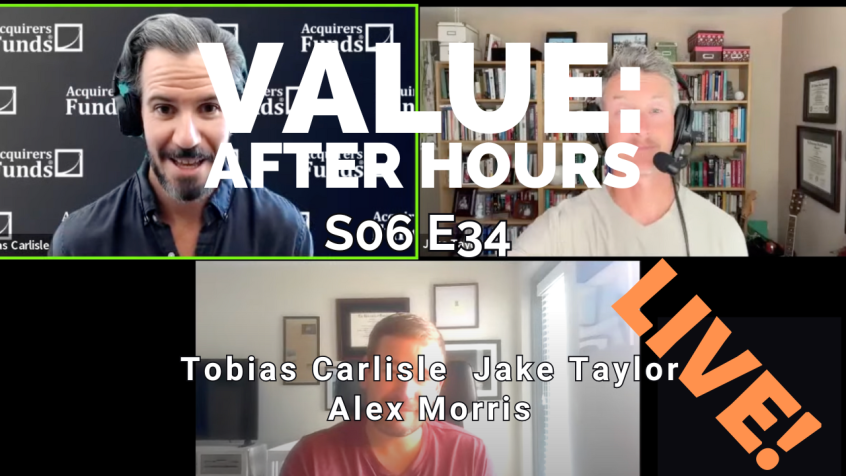During their recent episode, Taylor, Carlisle, and Alex Morris discussed Dollar General & Dollar Tree: Facing Toughest Economic Conditions Ever. Here’s an excerpt from the episode:
Tobias: What do you see when you look at Dollar General, Dollar Tree?
Alex: I think it’s a very interesting situation for both of them. I think you can start with– We’ve come through a period where I think objectively, if you shop at either of those stores, which I do as much as possible– It’s easier for me to shop at Dollar Tree than it is at Dollar General, given where I live. There’s been a move towards the consumable side of the business, and there’s also been pressure in terms of how much volume moves to these stores, and then as a result of that, how much they can invest in whether it’s maintenance, CapEx, labor, etc., which obviously all that has an impact on shopping experience, how they’re responding to that and what’s happening at this moment.
Again, I think if you take them at their word, I think Dollar Tree CEO specifically said– He was the former Dollar General CEO, by the way, back in the, call the, early 2010s. He basically said, “This is the most challenging period that they’ve ever seen for their poor customer.” Dollar General’s commentary is very similar to that.
If you compare it to a period like, call it, 2007, 2008, 2009, which I did in my most recent write up, my conclusion from looking at that period is you do have an interesting starting point in that window where these guys results roll over a little bit or become weaker somewhat unexpectedly and unexplainably, particularly when you look at–
Someone like a Walmart was still putting up fairly decent results at that time, but then as you saw that roll through their perspective of, “Hey, we win,” as people trade down, as things really get difficult. We may get hit on the frontend, but we can benefit in some ways as that expands further to a different consumer base. That showed up during call it the financial crisis period. Whether or not this is similar to that, obviously, we’ll see over time.
But it is interesting. If you just look at that starting period and call it mid to late 2007, these guys started to see their results get hit in a way that was a little bit different than certain other retailers. So, again, we’ll see if there’s any correlation between those two things. It’s hard totally understand exactly what drove that, but it is what happened last time around.
Tobias: You see those guys as canary’s in the coal mine potentially?
Alex: Dollar General talked about an average household income of $35,000 to give you context what we’re talking about here. Especially, as Walmart’s done better on things like omnichannel, either delivery to your home or buy online pickup and store in the parking lot. They’ve moved up the income levels where they play at.
I personally think it’s fair to say that they serve a different consumer than what Walmart does on average. But again, as always, you can point to macro stuff when macro may be a part of it, and there could be competitive stuff going on as well. It certainly serves your narrative better if it’s just a macro issue as opposed to a competitive issue.
Tobias: Yeah.
Jake: Yeah. Or, [Alex laughs] internally screwing something up. “That wasn’t our fault. That was–”
Alex: Weather a macro are a lot easier to blame than something that you’re doing. [chuckles]
Tobias: I’ve tracked large cap, mid cap and small cap earnings since COVID. It’s definitely the case that large cap suffered along with everything else, but then bounced and found new all-time highs pretty quickly and really hasn’t looked back–
Jake: Earnings wise?
Tobias: Earnings wise, yeah.
Jake: Okay.
Tobias: Also reflected in the stock prices, but
Jake: Yeah.
Tobias: -did certainly, in the earnings and the margins. Mid has gone sideways and small is really down. They got whacked in COVID, and then hasn’t really got off the mat, still trending down. I think that all that is reflected in the stock prices. The stock prices are high at the high end and squashed at the low end.
Jake: Yeah. I know interest expense definitely mattered more for the low end.
Tobias: Yeah.
Jake: They borrowed shorter and just didn’t lock in long-term like the S&P 500 did.
Tobias: Not locked in. Got to get locked in.
Jake: Got to get locked in.
You can find out more about the VALUE: After Hours Podcast here – VALUE: After Hours Podcast. You can also listen to the podcast on your favorite podcast platforms here:
For all the latest news and podcasts, join our free newsletter here.
Don’t forget to check out our FREE Large Cap 1000 – Stock Screener, here at The Acquirer’s Multiple:



